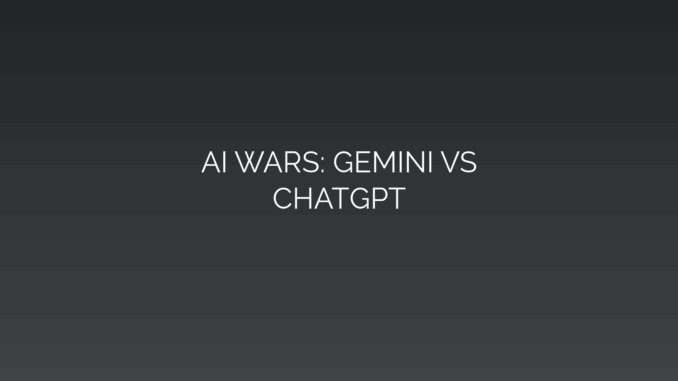
The AI Wars: Gemini vs ChatGPT – Titans Clash in the Generative Arena
The explosive growth of generative artificial intelligence has ignited a fierce rivalry between two of the most advanced language models: Google Gemini and OpenAI ChatGPT. As businesses and individuals increasingly rely on AI for creativity, productivity, and decisionmaking, understanding the differences between these platforms becomes critical. This analysis dissects their architectures, strengths, weaknesses, and ideal use cases, providing clarity for those navigating the rapidly evolving landscape of AI assistants.
A Technological Backdrop: Origins and Evolution Google Gemini emerged from Google DeepMind in late 2023 as the successor to LaMDA and PaLM. Built from the ground up for multimodality, it processes text, images, audio, and video natively. Google leveraged its vast infrastructure—including custom Tensor Processing Units (TPUs)—to train Gemini across trillions of tokens, prioritizing realtime reasoning and seamless integration with its ecosystem (Gmail, Docs, etc.).
OpenAI ChatGPT, powered by GPT (Generative Pretrained Transformer), debuted in 2022. Its latest iteration, GPT4 Turbo, refined earlier versions with enhanced context windows (128K tokens) and extensive thirdparty plugin support. ChatGPT benefits from Microsoft’s Azure infrastructure and a massive user base that fuels iterative learning.
Core Capabilities: HeadtoHead Comparison 1. Multimodal Proficiency
- Gemini excels in native multimodal understanding. Its Ultra 1.0 model can simultaneously analyze spreadsheets, interpret scientific diagrams, and generate image descriptions without switching tools. Ideal for visual learners and data-intensive tasks.
- ChatGPT requires GPT-4 with Vision or Dall-E integration for similar functionally. Its approach is powerful but modular—text remains its strongest suit.
2. Reasoning and Accuracy
- Gemini claims superior performance in benchmarks like MMLU (Massive Multitask Language Understanding), especially in STEM, thanks to targeted training on scientific datasets. Its “chain-of-thought” approach mimics human problem-solving steps.
- ChatGPT demonstrates strong real-world reasoning through tools like Code Interpreter and custom GPTs. Hallucinations persist in both models but are mitigated in GPT-4 by retrieval-augmented generation (RAG) techniques.
3. Coding and Technical Tasks Both support major programming languages (Python, Java, C++), with key differences:
- Gemini: Deep integration with Google Colab and Firebase streamlines development workflows. Excels at debugging cloud-based applications.
- ChatGPT: Dominates in collaborative coding via platforms like Replit and GitHub. Its Code Interpreter executes scripts and visualizes data natively.
4. Integration and Accessibility
- Gemini is embedded across Google Workspace (via Gemini for Workspace) and Android. Free tier uses Pro 1.0; Ultra requires a $20/month Google One AI Premium subscription.
- ChatGPT offers broader third-party compatibility via plugins and the GPT Store. Free users access GPT-3.5; GPT-4 Turbo requires ChatGPT Plus ($20/month). Enterprise plans include API credits and enhanced security.
Key Challenges: Limitations and Ethical Concerns Despite advancements, both models face scrutiny:
- Bias and Safety: Google employs stricter content filters, occasionally leading to overcaution (e.g., refusing benign requests). OpenAI balances flexibility with safeguards but faces challenges in controlling misinformation.
- Context Handling: Gemini processes ultra-long documents efficiently but struggles with nuanced, layered instructions. ChatGPT’s 128K context window aids complex tasks but increases latency.
- Cost Efficiency: Gemini’s token pricing undercuts GPT-4 Turbo for high-volume users, though ChatGPT’s plugin ecosystem reduces operational overhead for businesses.
Strategic Showdown: Who Wins Your Use Case? Choose Gemini For:
- Tasks requiring visual-data synthesis (e.g., chart analysis or video summarization)
- Deep Google ecosystem integration
- Cost-sensitive, high-volume text generation
Opt for ChatGPT When:
- Customizability via GPTs and plugins is essential
- Collaborative coding or technical documentation is a priority
- Broad third-party app compatibility matters
Future Trajectories: What Lies Ahead Gemini’s roadmap prioritizes realtime agentic behavior—AI that autonomously books flights or schedules meetings using multimodal inputs. Google also explores memory retention for personalized interactions.
ChatGPT advances toward Artificial General Intelligence (AGI) with iterative GPT5 developments. OpenAI focuses on reducing costs, enabling ondevice processing, and expanding its assistant marketplace.
The Verdict Neither model is universally superior. Google Gemini shines in seamless multimodal intelligence and affordability, making it a powerhouse for integrated Google users. In contrast, OpenAI ChatGPT leads in extensibility and specialized applications, appealing to developers and enterprises seeking tailored solutions. As the AI wars intensify, both platforms will drive innovation—forcing competitors to elevate capabilities while democratizing access to transformative technology. For users, the winner isn’t Gemini or ChatGPT; it’s the collective acceleration of AI capabilities reshaping human potential.
Final Recommendation: Test both models using your typical workflows. Prioritize Gemini for visual and contextual tasks; leverage ChatGPT for customization and technical precision. Monitor updates—both giants evolve monthly.

Leave a Reply